OLD ENGLISH

Texts and Studies Volume 463 MRTS TEXTS FOR TEACHING Volume 8
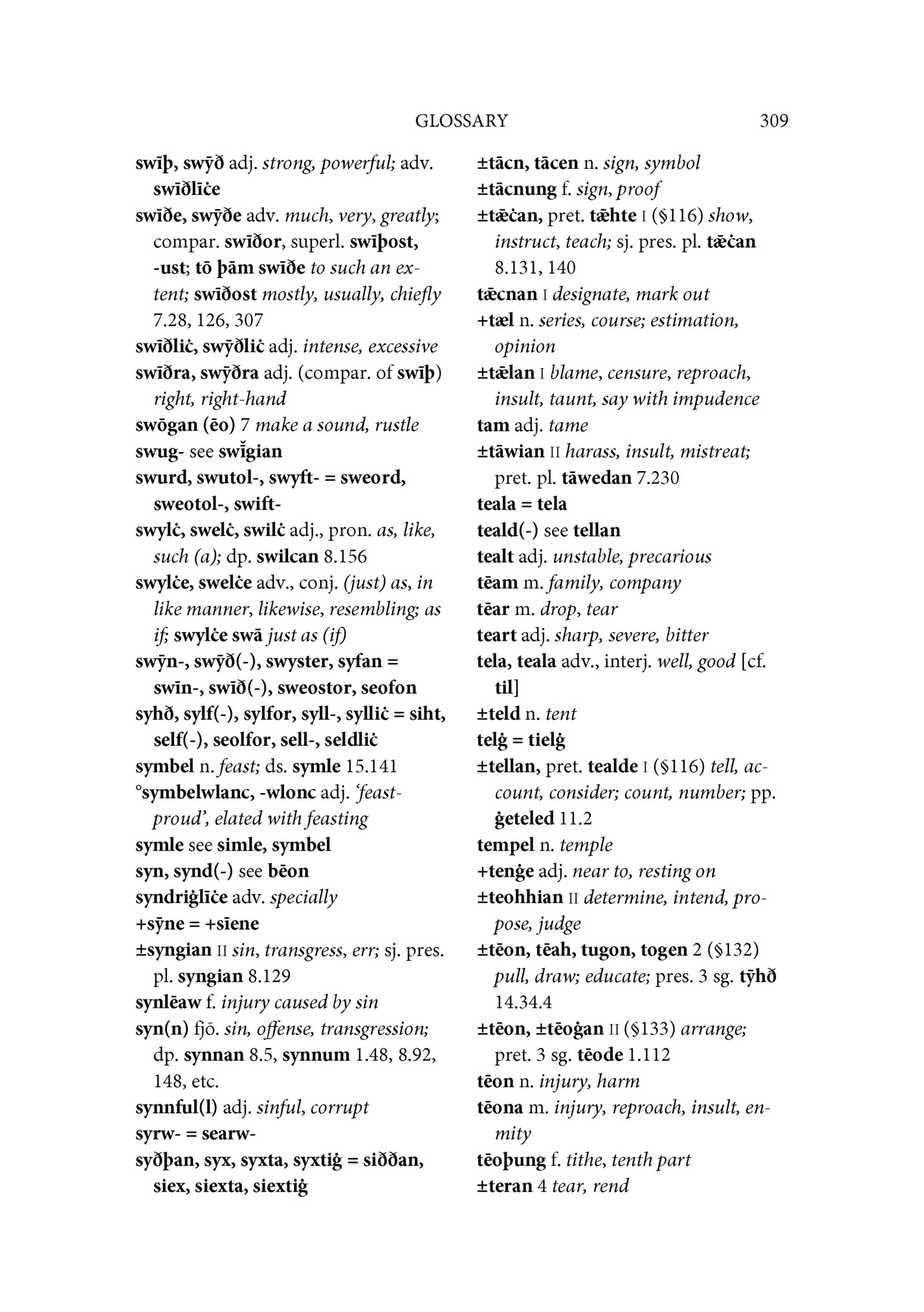
Old English with an Anthology of Readings by R. D. Fulk Tempe, Arizona 2014

R. D. Fulk This book was originally published in 2014 by the Arizona Center for Medieval and Renaissance Studies at Arizona State University, Tempe Arizona. When the book went out of print, the press kindly allowed the copyright to revert to the author, so that this corrected reprint could be made freely available as an Open Access book.
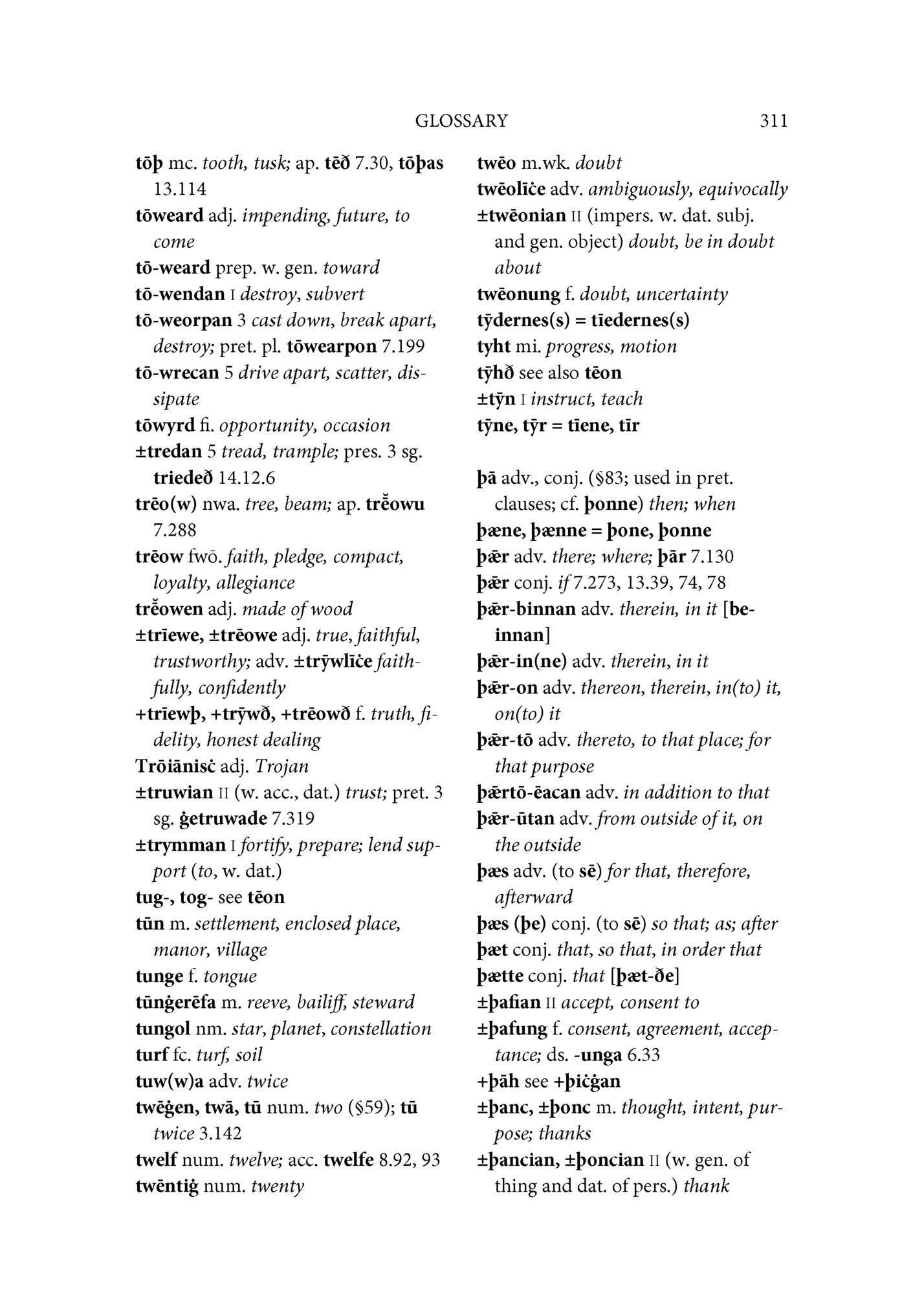
viii PREFACE ABBREVIATIONS ix WORKS CITED xi I. GRAMMAR INTRODUCTION (§§1–8) 3 CHAP. I 8 (§§9–24) Phonology and Orthography CHAP. II (§§25–31) Grammatical Gender • Case Functions • Masculine a-Stems • Anglo-Frisian Brightening and Restoration of a 16 CHAP. III (§§32–8) Neuter a-Stems • Uses of Demonstratives • Dual-Case Prepositions • Strong and Weak Verbs • First and Second Person Pronouns 21 (§§39–45) ō-Stems • Third Person and Reflexive CHAP. IV Pronouns • Verbal Rection • Subjunctive Mood 26 CHAP. V of bēon 31 CHAP. VI (§§46–53) Weak Nouns • Tense and Aspect • Forms (§§54–8) Strong and Weak Adjectives • Infinitives 35 CHAP. VII (§§59–66) Numerals • Demonstrative þēs • Breaking • Final Fricatives • Degemination • Impersonal Verbs 40 CHAP. VIII (§§67–72) West Germanic Consonant Gemination and Loss of j • wa-, wō-, ja-, and jō-Stem Nouns • Dipthongization by Initial Palatal Consonants 44 (§§73–8) Proto-Germanic e before i and j • Front CHAP. IX Mutation • hwā • Verb-Second Syntax 48 CHAP. X (§§79–83) Present Inflections of Strong Verbs • Consonant-Stem Nouns • Conjunctive Adverbs 52 CHAP. XI (§§84–90) Strong Verbs of the First and Second Classes • Conjugation of Strong Verbs • Absolute Constructions 57 CHAP. XII Prefixes 61 (§§91–4) Strong Verbs of the Third Class • Verb
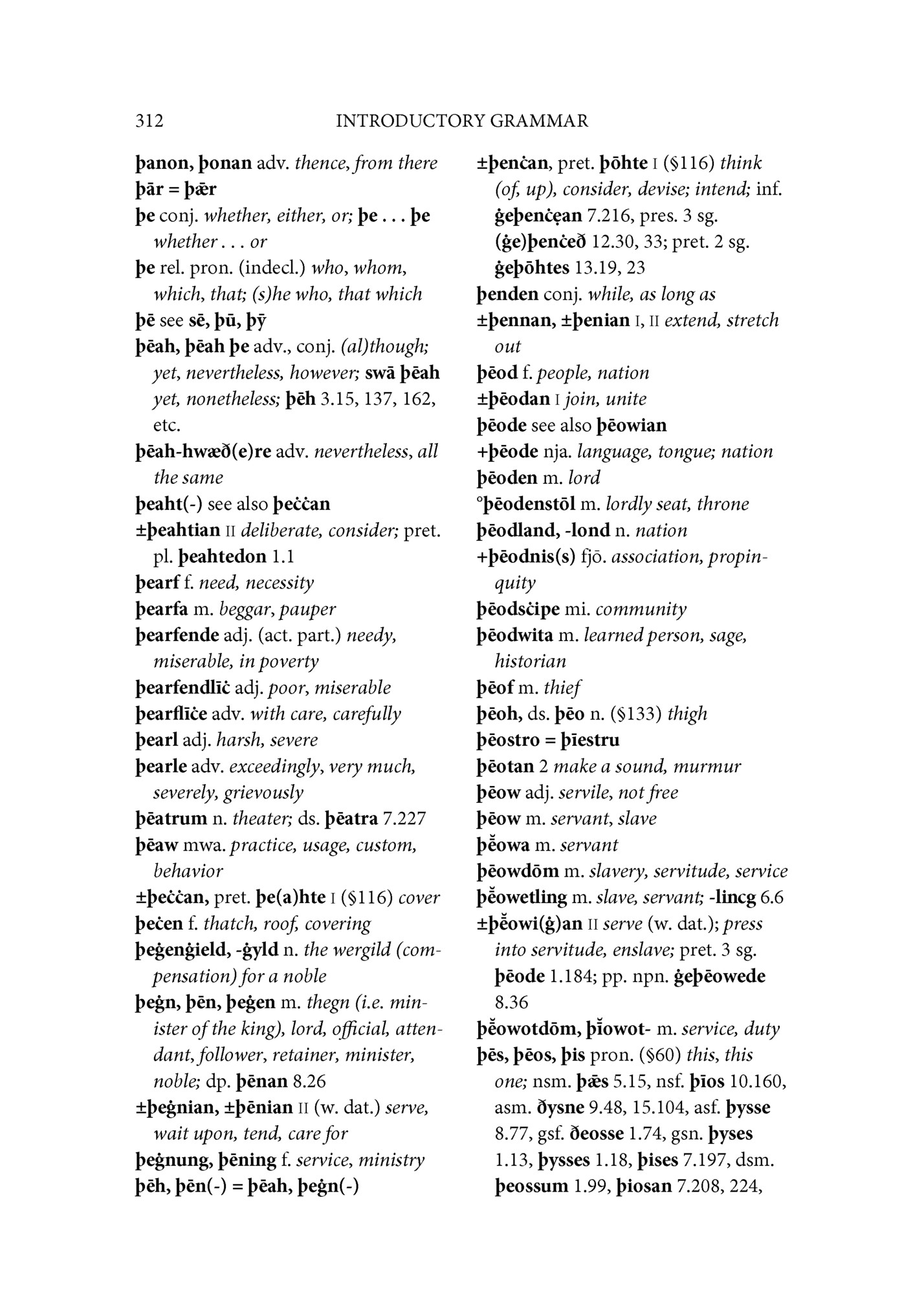
CHAP. XIII (§§95–100) Strong Verbs of the Fourth and Fifth Classes • i- and u-Stem Nouns • Variant Spellings with g 66 CHAP. XIV (§§101–6) Strong Verbs of the Sixth and Seventh Classes • Variant Spellings with hr- • Contractions with ne • Negative Concord 71 CHAP. XV (§§107–11) Weak Verbs of the First Class • West Saxon Spellings • æ before Nasal Consonants 76 CHAP. XVI (§§112–18) Conjugational Irregularities in Weak Verbs of the First Class • Confusion of High Front Vowels 81 CHAP. XVII (§§119–22) Back Mutation • Weak Verbs of the Second and Third Classes • Change of sel- to syl-/sil- 85 CHAP. XVIII (§§123–6) Preterite-Present Verbs • Prehistoric Anglo-Frisian Loss of Nasals before Fricatives • Confusion of iġ and ī • Convergence of Unstressed Vowels 89 CHAP. XIX (§§127–30) Strong Verbs with Weak Presents • Comparison of Adjectives and Adverbs 93 CHAP. XX (§§131–3) Loss of Medial h • Contracted Verbs, Nouns, and Adjectives 98 CHAP. XXI (§§134–8) Anomalous Verbs • Rules for Palatalization and Affrication • Rules for Apocope and Syncope 102 APPENDIX A: SOUND CHANGES IN THE HISTORY AND PREHISTORY OF ENGLISH. I. Grimm’s Law • II. Verner’s Law • III. Chief Developments of the Germanic Consonants into Old English • IV. Chief Developments of the Stressed Vowels • V. Chief Developments of the Unstressed Vowels • VI. The Proto-Indo-European Origins of Old English Ablaut • VII. Sound Changes in the Language after the Old English Period 107 APPENDIX B: OLD ENGLISH DIALECTS, WITH DIALECT TEXTS I. General • II. Specifically Kentish Characteristics • III. General Anglian Features • IV. Specifically Mercian Characteristics • V. Specifically Northumbrian Characteristics • VI. The Poetic Dialect • VII. Samples of Texts in Non-Saxon Dialects 118 APPENDIX C: OLD ENGLISH POETIC DICTION AND POETIC FORM I. Poetic Diction • II. Poetic Form 132 vi
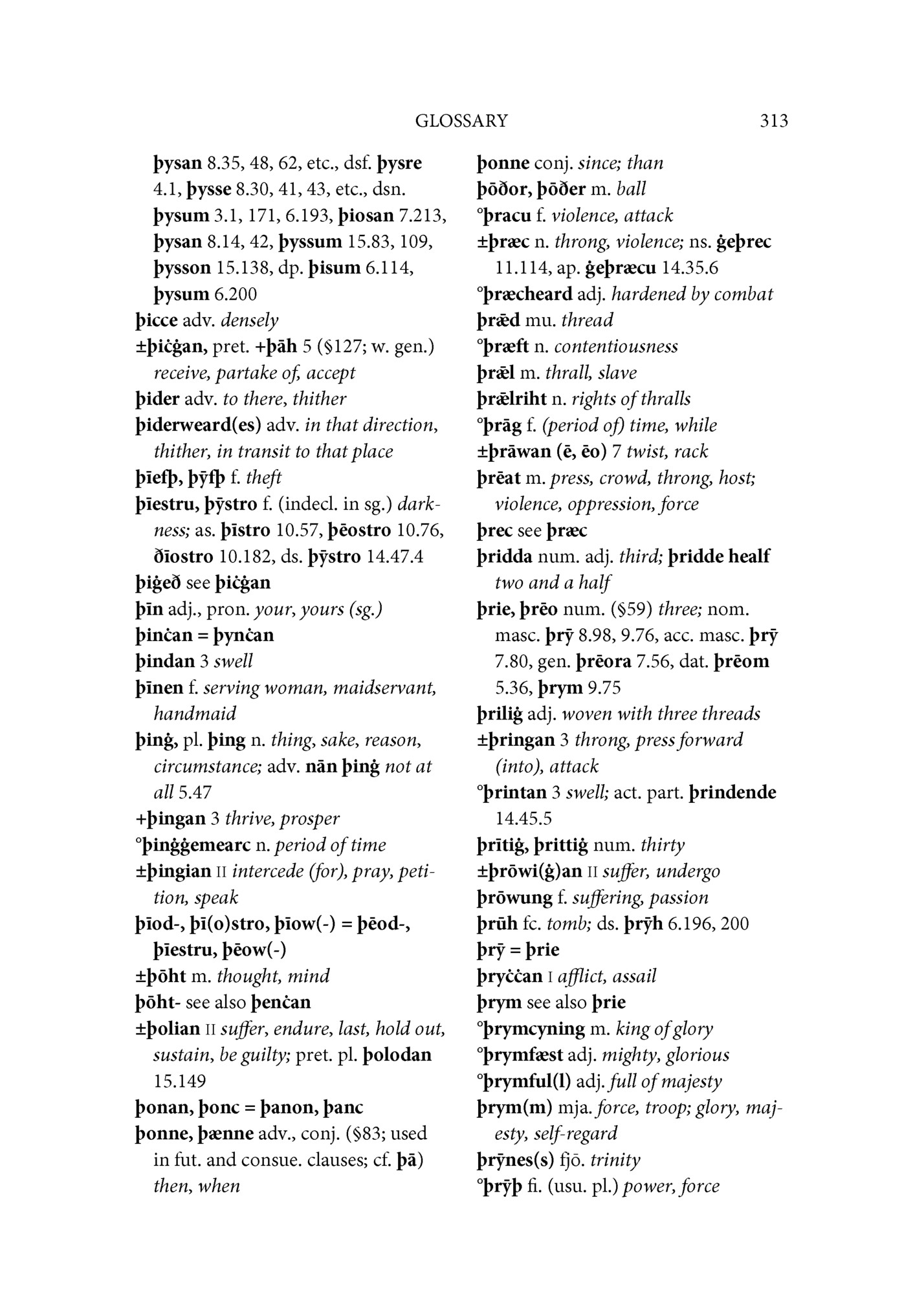
II. ANTHOLOGY 1. TWO SELECTIONS FROM THE OLD ENGLISH BEDE A. THE ARRIVAL OF THE ANGLO-SAXONS IN BRITAIN B. THE STORY OF CÆDMON 2. KING ALFRED’S PREFACE TO THE PASTORAL CARE 3. SELECTIONS FROM THE PARKER CHRONICLE FOR 892–900 4. ÆLFRIC ON THE THREE ESTATES 5. THE VISION OF LEOFRIC 6. ÆLFRIC’S PASSION OF SAINT AGATHA 7. THREE SELECTIONS FROM THE OLD ENGLISH OROSIUS A. THE VOYAGES OF OHTHERE AND WULFSTAN B. THE AMAZONS C. PYRRHUS’S WARS WITH ROME 8. SERMO LUPI AD ANGLOS 9. WULFSTAN, DE FALSIS DIES 10. BOETHIUS AND THEODORIC 11. CONSTANTINE GOES TO BATTLE, FROM CYNEWULF’S ELENE 12. VAINGLORY 13. SOUL AND BODY II 14. A SELECTION OF RIDDLES FROM THE EXETER BOOK 15. DREAM OF THE ROOD 16. THE WANDERER 139 139 141 145 148 153 156 159 166 166 170 172 175 180 183 189 195 198 202 214 219 NOTES ON THE TEXTS 223 GLOSSARY 251 NAMES OF PERSONS, PEOPLES, AND PLACES 325 GRAMMATICAL INDEX 330 RESOURCES FOR STUDENTS OF OLD ENGLISH 332
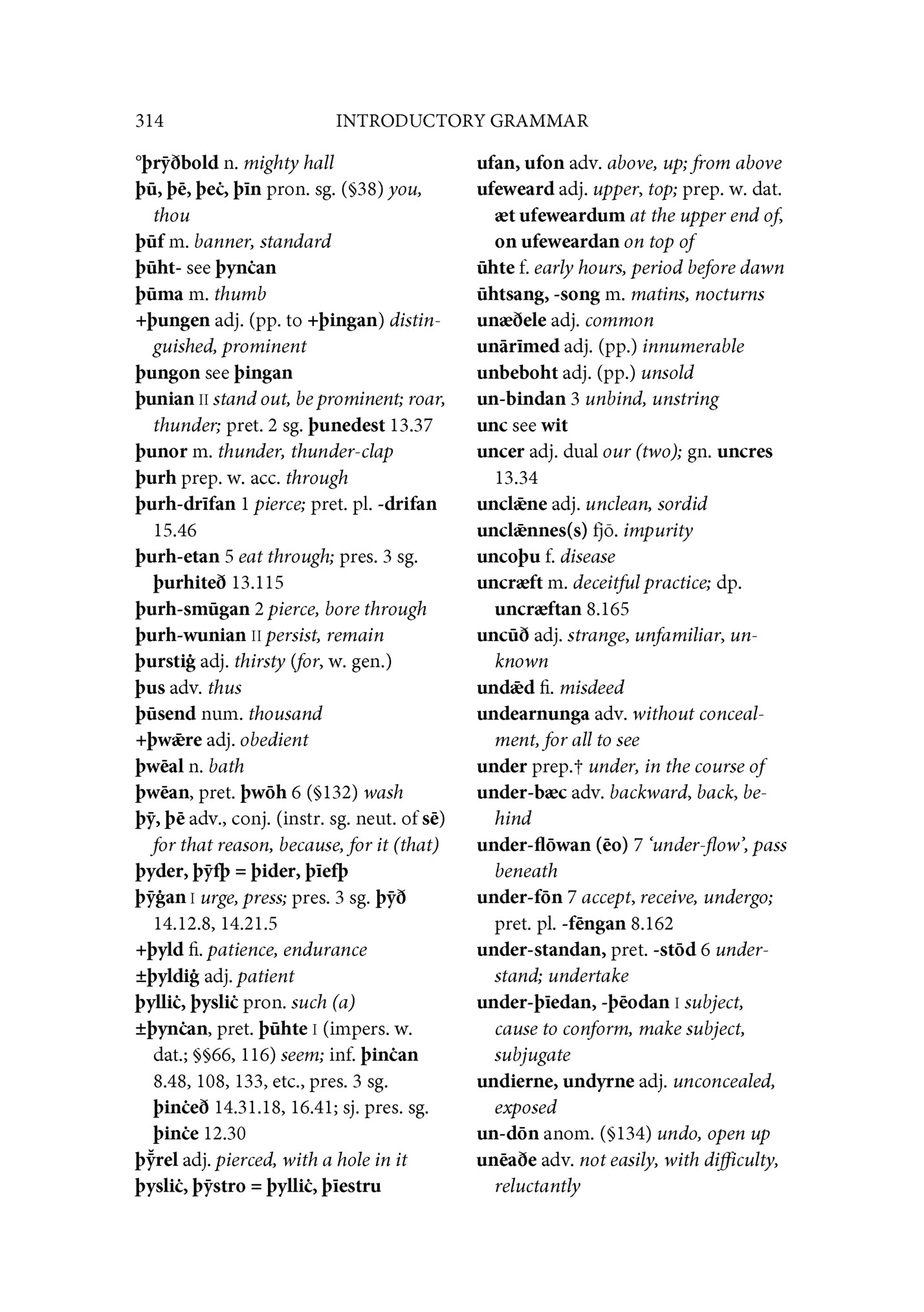
This book was initially drafted in 1998. The grammar has been employed and refined in the many intervening years in the almost yearly classes in elementary Old English that I have been fortunate to offer. My greatest burdern of debt is to the many students, mostly graduates, though also some undergraduates, who have studied it intensively and offered keen insights into how it might be improved. I am particularly grateful to Colin Grant, who compiled an enormous amount of material to be added to the Glossary. Users of the book will doubtless recognize its heavy reliance upon the example of its forebears in the history of Old English pedagogy. I was myself taught elementary Old English from Marckwardt and Rosier’s Old English Language and Literature, which plainly owes a heavy debt to Moore, Knott, and Hulbert’s Elements of Old English, and from Bright’s Old English Grammar and Reader, as revised by Cassidy and Ringler, a book which in its earlier editions must in turn have inspired much in Moore and Knott’s book. The structure of this book, offering elements of grammar distributed among measured chapters capped by graduated readings, a structure particularly suited to use by graduate and advanced undergraduate students, is common to all of these books, and its disappearance from the considerable array of Old English grammars currently available is the chief rationale for contributing yet another work to that pile. The book was accepted for publication some ten years ago, but other obligations prevented its completion, since the labor demanded by the need to compile an anthology of texts to accompany the grammar and glossarize it was considerable. I wish to express my warmest gratitude to Robert E. Bjork, not only for supporting this project from the start, but for prodding me in gentle and kindly fashion after many years of neglect to fulfill the obligation incurred. Thanks are also due to the anonymous referees for the press, who suggested the most beneficial changes, and specifically to Donka Minkova, who after many years (correctly) thought the assessment so remote in time that she might safely admit to having been one of those referees, and who thereupon offered further needed encouragement about completing the project. My thanks also go to Roy Rukkila and Todd Halvorsen at ACMRS for their patience and their kind assistance with the production of this volume. R.D.F. Bloomington, Indiana December, 2013 viii
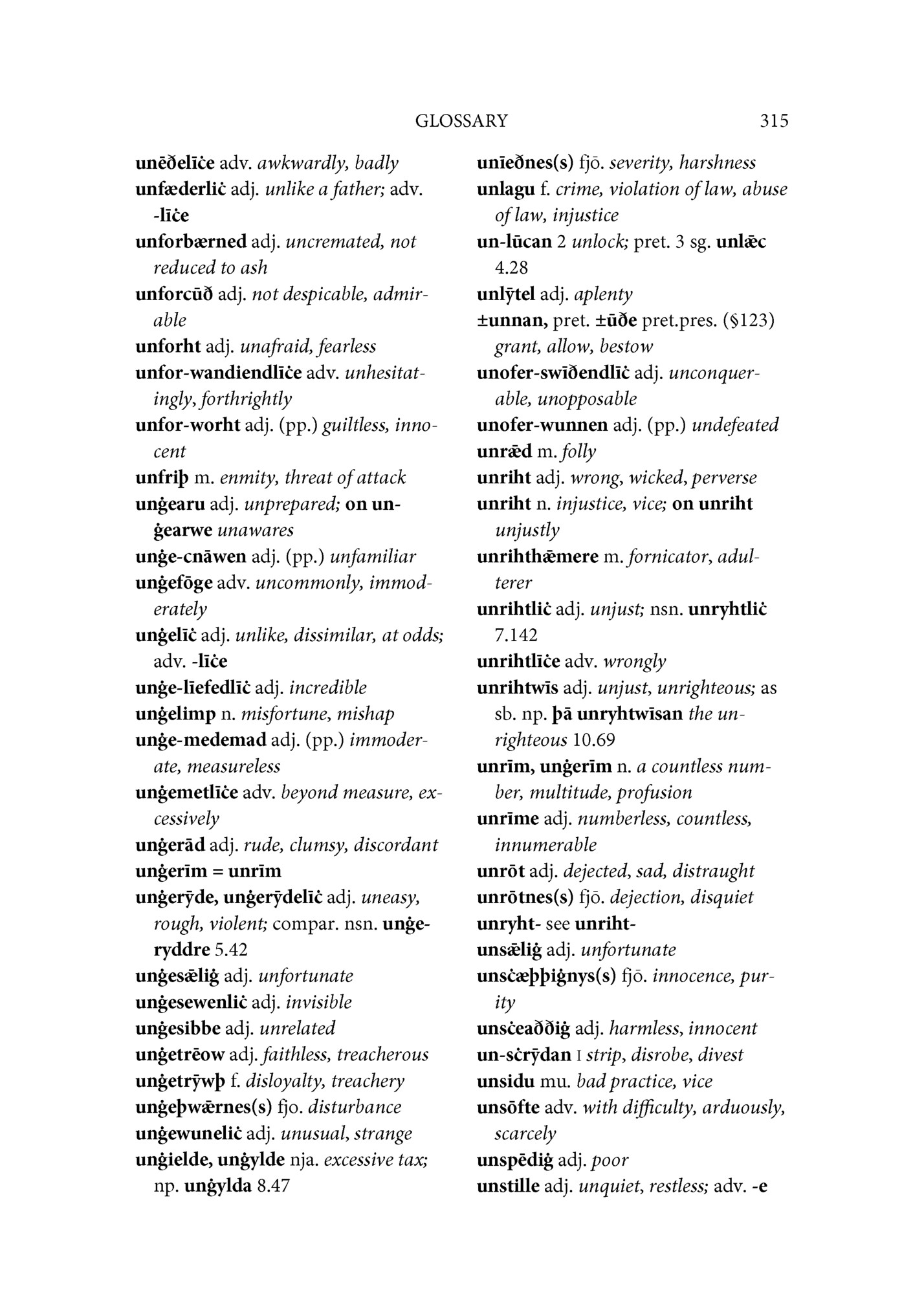
In the autumn term of 2018 I came out of retirement to teach Old English. In the course of the semester my students noticed a number of typographical errors in this book, in addition to those I noticed, myself. A further error was reported by Mr. Axel Batalha. Thanks are due to them for the corrections made to this reprint of the book. Thanks are also owing to Mr. Corvin Russell for bringing it to my attention that the book had gone out of print, and to Roy Rukkila at ACMRS for releasing the copyright and advising about Open Access. R.D.F. Bloomington, Indiana June, 2020 ABBREVIATIONS a. or acc. act. adj. adv. anom. c. compar. conj. consue. d. or dat. decl. EWS f. or fem. Fr. fut. g. or gen. Germ. Gk. Gmc. Go. i. accusative active adjective adverb anomalous (verb) consonant-stem comparative conjunction consuetudinal dative declined Early West Saxon feminine French future genitive German Greek Germanic Gothic i-stem IE imp. impers. ind. indecl. indef. inf. infl. instr. interj. interr. intrans. ja. Kent. Lat. LWS m. or masc. ME Merc. MnE MnIcel. ix Indo-European imperative impersonal indicative indeclinable indefinite infinitive inflected instrumental interjection interrogative intransitive ja-stem Kentish Latin Late West Saxon masculine Middle English Mercian Modern English Modern Icelandic

Fleepit Digital © 2021